Key takeaways:
- The transition from PHP to Python was motivated by Python’s clean syntax, vast libraries, and supportive community, making coding more intuitive and enjoyable.
- Engaging with the Python community enhanced learning through shared knowledge and support from experienced developers.
- Resources like online platforms, tutorials, and official documentation were crucial in easing the learning process and deepening understanding of Python concepts.
- The experience highlighted the importance of code readability, which boosts collaboration and problem-solving within software development.
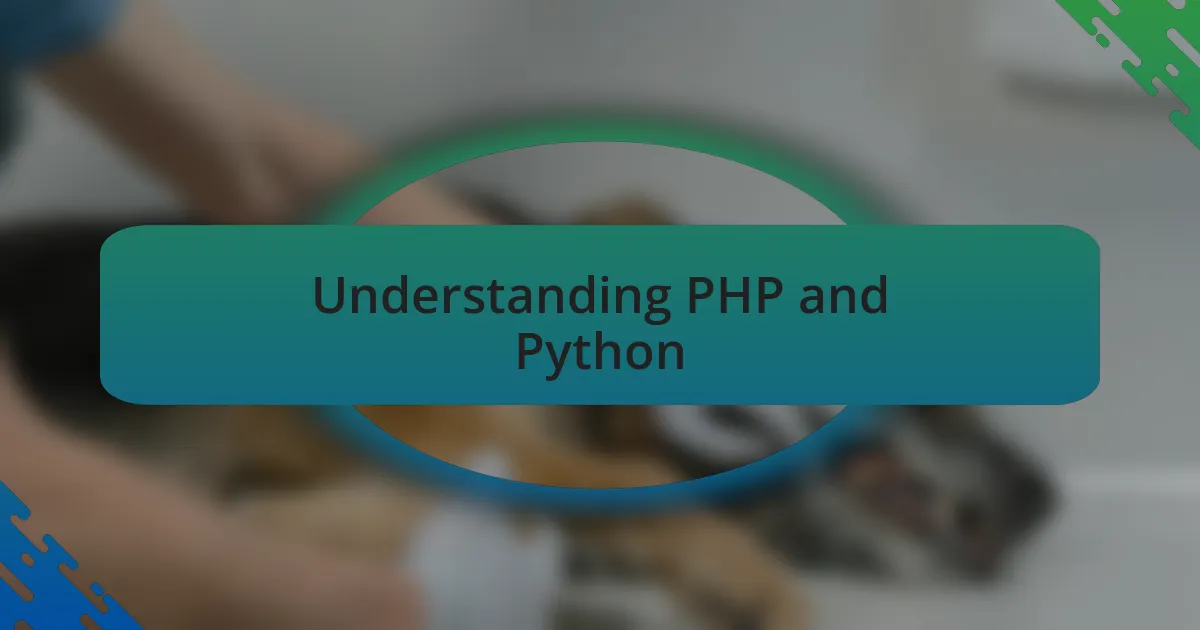
Understanding PHP and Python
PHP, a server-side scripting language, has long been a staple for web development, especially for projects involving dynamic websites and applications. I remember the early days of coding in PHP, where I felt a certain thrill as my scripts brought static web pages to life. The way PHP seamlessly integrates with HTML made it feel like an extension of creativity in coding, but it did come with its share of quirks that often left me scratching my head.
On the other hand, Python emerged as a breath of fresh air for me, with its clean and readable syntax that emphasizes simplicity. When I first wrote a few lines in Python, I was struck by how much more intuitive it felt compared to PHP. It was as if programming in Python was less about wrestling with the language and more about focusing on the logic and problem-solving aspect itself. Have you ever had that moment where you realize a tool not only enhances your work but also makes the entire process enjoyable? That’s how I felt with Python.
Both languages serve distinct purposes and come with their own sets of advantages. While I appreciated PHP’s strengths in web development, I found Python’s versatility appealing for tasks beyond just web contexts, such as data analysis and automation. This adaptability sparked my curiosity and nudged me toward a transition that I hadn’t fully anticipated but turned out to be incredibly fulfilling.
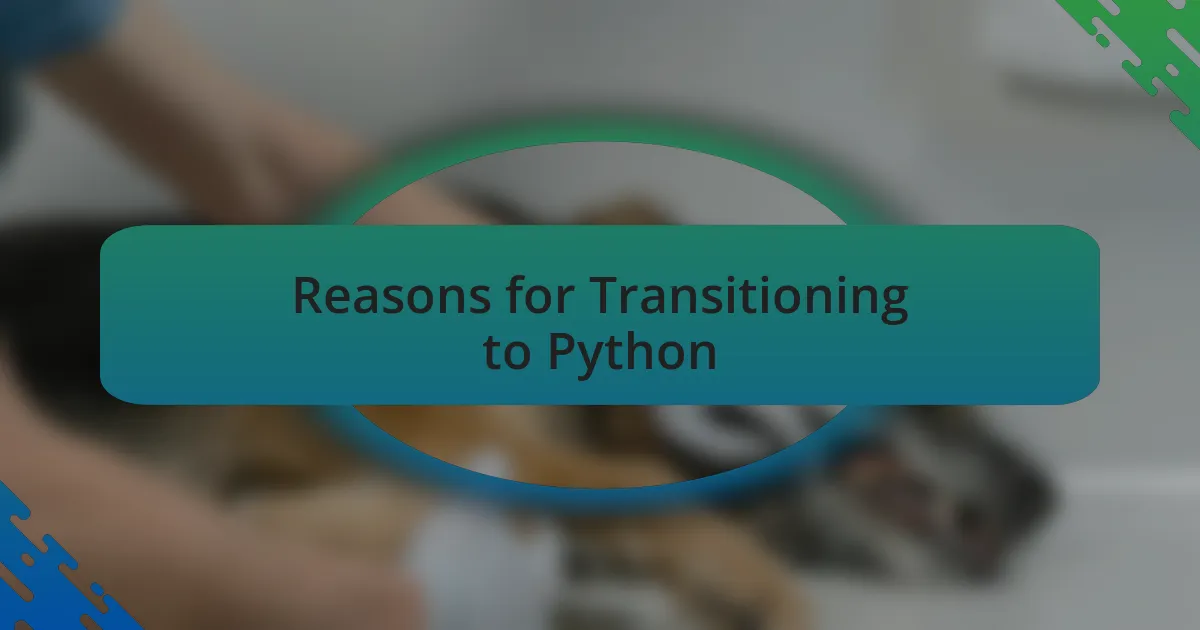
Reasons for Transitioning to Python
One of the primary reasons I transitioned to Python was its vast ecosystem of libraries and frameworks. I remember feeling like a kid in a candy store when I discovered tools like NumPy and Pandas, which opened doors to data science I had only dreamed of exploring with PHP. It was exhilarating to realize that I could harness powerful pre-built functions to accomplish complex tasks swiftly and efficiently.
Another compelling factor was Python’s active community. After years of coding mostly in isolation with PHP, I was welcomed into a vibrant and supportive network of developers. It was comforting to connect with others who shared their knowledge freely, whether through forums, tutorials, or meetups. Have you ever experienced that moment when you realize there’s a community out there that genuinely wants to help you grow? This sense of belonging fueled my motivation and transformed learning Python into a collaborative journey.
Moreover, the readability of Python’s syntax made it easier for me to maintain and scale projects. Unlike the sometimes tangled code I had written in PHP, Python’s structure allowed me to return to my code after a break and understand it almost instantly. That clarity not only saved me hours of debugging but also empowered me to tackle more ambitious projects without feeling overwhelmed. In my opinion, this simplicity is not just a convenience; it’s a fundamental aspect that enhances creativity and innovation in software development.
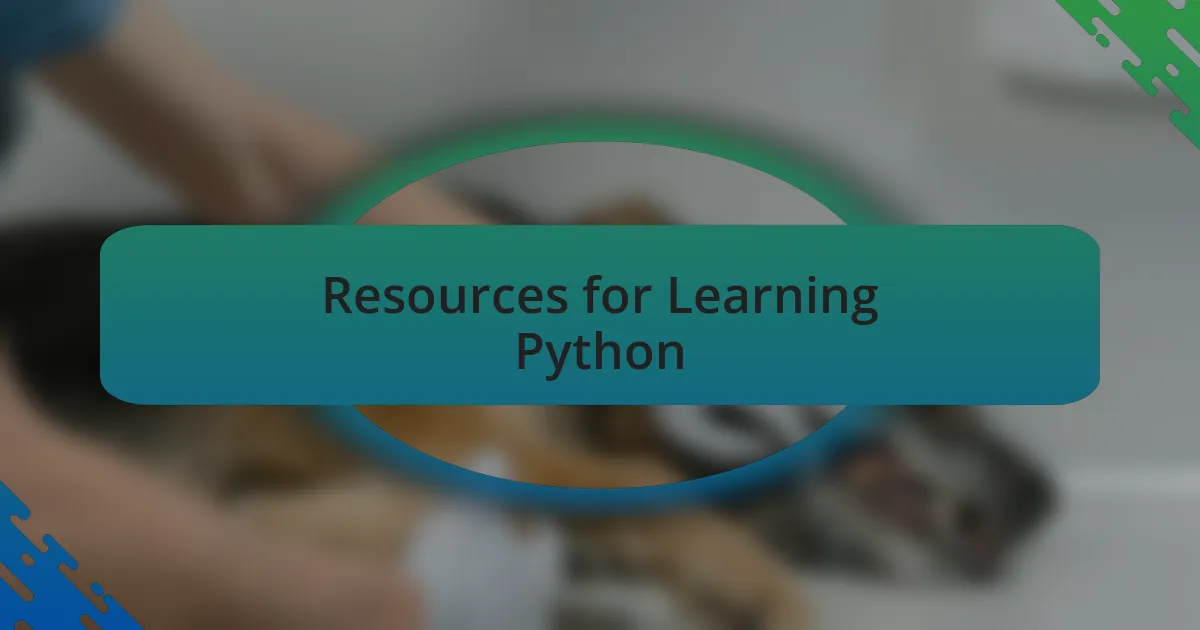
Resources for Learning Python
When I first dove into learning Python, I found immense value in online platforms like Codecademy and Coursera. These resources provided a structured approach that eased my transition, allowing me to grasp the fundamentals without feeling overwhelmed. I vividly recall sitting in my living room, conquering each module—and the sense of accomplishment after completing my first few projects was truly electrifying.
I also tapped into YouTube for tutorials, where I stumbled upon fantastic channels like Corey Schafer’s and FreeCodeCamp. Visual learning just clicked for me. Watching someone tackle problems in real-time resonated with my own coding struggles, and it really felt like I was sitting next to a mentor. Can you relate to that moment when a concept suddenly clicks while watching a tutorial? It’s those small wins that keep you pushing forward.
Lastly, I can’t emphasize enough how helpful Python documentation has been. The clarity and thoroughness of the official documentation often turned what seemed like a daunting task into something manageable. I remember hitting a wall while trying to understand list comprehensions, but a quick dive into the docs unraveled the mystery for me. It’s like having a guidebook that’s there whenever you need it—don’t overlook this incredible resource!
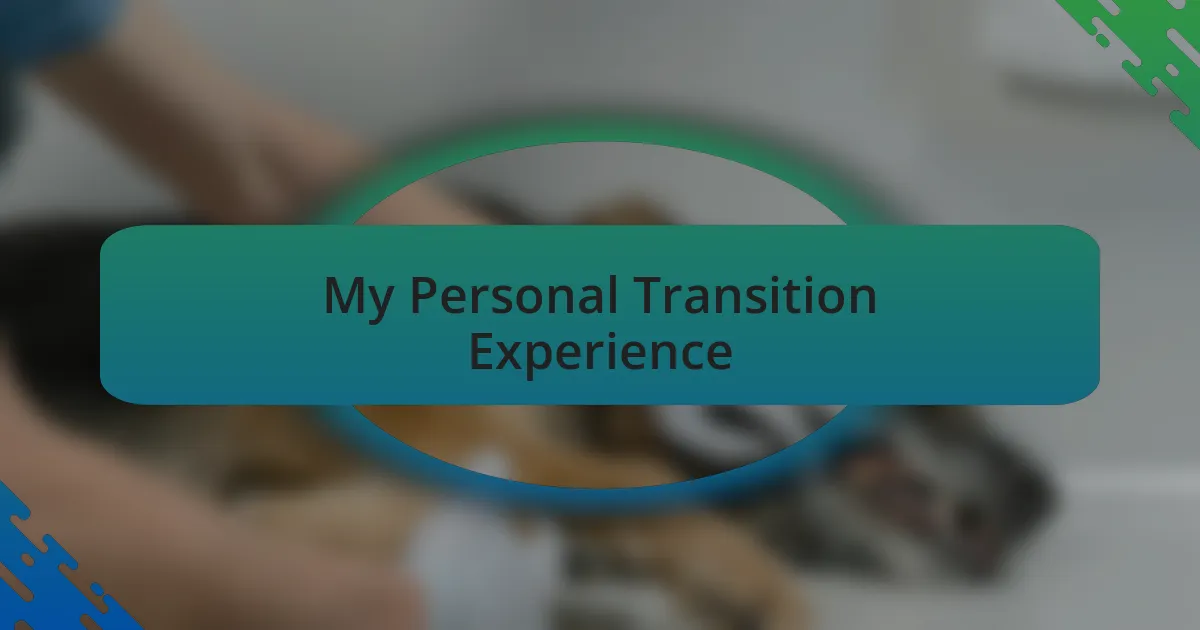
My Personal Transition Experience
Transitioning from PHP to Python was surprisingly liberating for me. I remember the initial hesitation, thinking back to my days immersed in PHP’s syntax and conventions. It felt like stepping into a completely new world where simplicity and readability took center stage. As I navigated through Python’s elegant syntax, I felt a sense of relief washing over me. Have you ever had that moment when everything just makes sense?
I’ll never forget the first time I wrote a simple script in Python that tackled a task that the same code in PHP would have taken much longer to produce. That flash of efficiency was like discovering a secret weapon. I realized I was not just learning a new language; I was unlocking new ways to think about problems. It was invigorating to see how quickly I could develop features and functionalities, which left me excited about the possibilities ahead.
What I didn’t anticipate was how the Python community would be such a supportive asset during my transition. I recall joining forums and chat groups where veterans shared their insights, boosting my confidence. It’s fascinating how a few encouraging words from someone more experienced can transform your mindset. Isn’t it incredible how a supportive community can make such a difference in your learning journey?
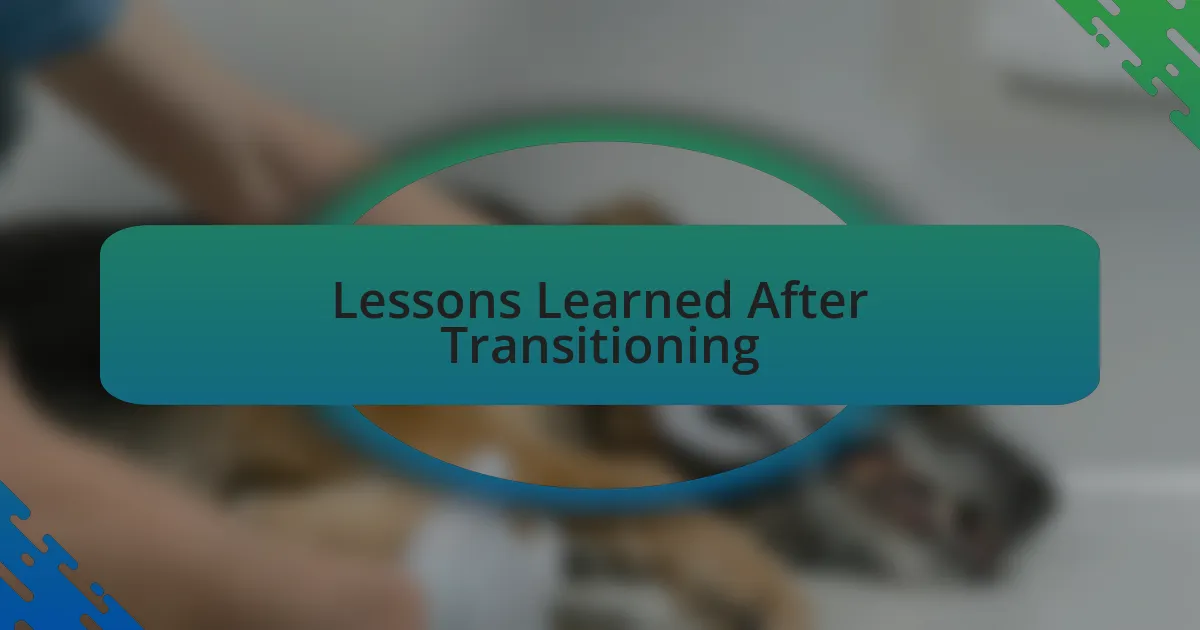
Lessons Learned After Transitioning
Making the leap from PHP to Python taught me a lot about the importance of community support. I vividly remember one evening when I was stuck trying to understand how to utilize list comprehensions. After a few frustrating hours, I reached out in a Python forum and got instant feedback that clarified everything. That moment reminded me how valuable it is to connect with others who are also navigating this journey—don’t underestimate the power of reaching out!
Another lesson I learned is to embrace the mindset of continuous learning. Transitioning to Python wasn’t about just flipping a switch; it was like opening a door to an exciting room filled with new concepts. I started taking in resources like podcasts and tutorials, indulging in the joy of discovering how Python’s libraries could handle tasks I once found cumbersome in PHP. Have you ever felt that exhilaration of learning something new? It’s a process that enhances not just your coding skills but also your overall problem-solving abilities.
Lastly, I came to appreciate the beauty of code readability in Python. One afternoon, I decided to revisit some of my older PHP code and found myself struggling to decipher what I had written. In contrast, when I reviewed my recent Python scripts, they felt almost self-explanatory. This clarity not only boosted my confidence but also deepened my appreciation for writing code that others can easily read and understand. How often do we think about the impact of our code on teamwork and collaboration? It’s a crucial aspect of software development that can’t be overlooked.